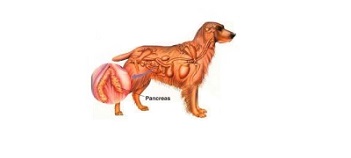
The inflammation of the pancreas is known as pancreatitis. Pancreatitis in dogs can be life threatening if it gets severe.
Pancreatitis in dogs can happen suddenly (acute) or over a period of time (chronic).
Both could be life threatening as the digestive enzymes can leak out of the pancreas during this time.
What is Pancreas?
Pancreas is a glandular organ situated between the stomach and first part of the small intestine (duodenum). It is an integral part of the endocrine and digestive system.
It has two main functions. One is the production of pancreatic enzymes for the digestion of nutrients and another is the production of hormones including insulin for the metabolism.
What happens when the enzymes leaks out?
When the inflammation of the pancreas occurs, the flow of enzymes into the digestive tract can be disrupted.
This will force the enzymes out of the pancreas into the stomach and the intestinal area.
If the digestive enzymes ever leaks out, it will start digesting the fat, proteins – basically anything on its path, even the pancreas itself and the surrounding organs.
If pancreatitis gets severe, due to the vicinity to the pancreas, vital organs like the kidney and liver can also be affected.
Organ damages due to pancreatitis can be permanent and irreversible.
Cause of pancreatitis in dogs:
All the causes that results in the pancreatitis in dogs are not yet found. However, there are certainly some factors seen in dogs which have pancreatitis.
Obesity, diabetes and internal infections are some diseases that can lead to pancreatitis.
Nutritional factors like lipemia (high fat level in blood) and hypercalcemia (high calcium level in bood) may also cause pancreatitis.
Studies have also shown that consumption of contaminated food and water, fatty food, human food, table scraps can also lead to pancreatitis.
Toxins or drugs, even antibiotics, zinc and calcium supplements, insecticides and pesticides can also lead to pancreatitis.
Viral and bacterial infection as well as metabolic disorders, trauma etc. could also be the factor.
There are also reports of pancreatitis in dogs after being bitten by scorpions. This is because scorpion venom can react to the pancreas leading to inflammation.
Breeds like Cocker Spaniel, Miniature Schnauzers and Miniature Poodle are more vulnerable because genetically they have high fat content in their blood.
Also the females and older dogs tend to get it more than the males and younger dogs.
If your dog had recent abdominal surgery then the chances of getting pancreatitis is pretty high as well.
Signs and symptoms:
Signs of pancreatitis in dogs may vary depending on the breed of dogs.
Symptoms include upset stomach, abdominal pain which gets more severe after eating, greasy poop, signs of tensed and arched back.
There are other varieties of symptoms that may be seen which includes:
- Fever
- Diarrhea
- Vomiting
- Weight loss
- Depression
- Dehydration
- Increased heart rate
- Difficulty breathing
- Anorexia- loss of appetite
- Fatigue – signs of being tired and slow
If bleeding occurs in the pancreas, shock may occur leading to collapse and even death very quickly.
Diagnosis:
Pancreatitis in dogs is diagnosed by a physical exam and blood tests. Veterinarian is also going to check for the occurrence of gallstones and a disorder called reflux.
Specially designed blood test like the cPLI (canine pancreatic lipase immunoreactivity) is done to check the level of pancreatic enzymes, amylase and lipase, and rule out other diseases.
Increase in level of white blood cell and liver associated enzymes may also occur during pancreatitis.
Since insulin producing cells can be damaged due to the inflammation of pancreas, normal level of insulin is also measured.
Deficiency of insulin may also lead to diabetes in dogs. So, tests for diabetes may also be done.
X-rays may also be done to see if pancreatitis is the problem or the symptoms are from any foreign body or gastrointestinal disease.
Ultrasound along with needle biopsy may also be done in some cases to search for cysts, abscesses or tissue growth.
Cure and healing:
Pancreatitis progresses quickly in dogs but this can be treated without any permanent damage to the organ.
If left untreated however, it may lead to severe organ damage, and even brain damage is inevitable.
So you have to take the dog to the vet where support, nutrition and help with the pain are going to be provided.
During pancreatitis, resting the pancreas and gastrointestinal system and letting the pancreas heal on its own is very important.
During this healing process, dog must be on fluid and nutritional support where the acid, base and electrolyte balance may need to be constantly monitored. No food and water should be given by mouth for up to a week.
After the dog gets better high fiber, low fat diet must be fed in order to maintain the pancreatic health.
Both acute and chronic pancreatitis can be life threatening. And pancreatitis in dogs is likely to reoccur if proper care is not taken.
Recognizing the signs and undergoing immediate treatment is the best way to deal with pancreatitis in dogs.
If you want to share an experience or expertise regarding pancreatitis in dogs, you are very welcome to do so in the comment section below.







Pancreatitis is very serious both in dogs and humans. With holiday season on the horizon, this is the best when dogs get exposed to all the fatty treats that could be dangerous to their health. So we must monitor what our pets are eating all the time, even Christmas season.
[…] to popular belief, fat does not make pets fat. Fat provides energy and helps your pet feel full. Too much fat can lead to pancreatitis, but a moderate amount of fat is healthy for any diet, even if your pet is […]
My 1 year old black lab died five days ago. She presented with diarrhea and vomiting. She quickly became lethargic. When we arrived at the ER vet her blood glucose was 30 and she had a temperature. Her gums were tacky and she was dehydrated. Her blood pressure and heart rate were low (they couldn’t feel a bracial pulse). The ER vet thought it was possibly Addisons Disease. Because of her age and the possibility of Addisons we continued to aggresively treat her. Her clotting times were off and heart rate was extremely high. She received multiple doses of plasma as well as human albumin injections. When the first Addisons test came back normal we thought she might have a blockage. A CT scan showed no blockage but did show clots in her lungs. It became clear that she was progressively getting worse. Her kidneys started to fail and sh began having trouble breathing. We decided to euthanize her. I brought her to Tufts University animal hospital to have a necropsy done. I recieved a preliminary report this afternoon that she had acute pancreatitis. It’s shocking how quickly it all happened. One minute she was fine and the next sh was in the ICU. Luckily our pet insurance pays 90% so we were able to use all resources available. Our dog never ate garbage or table scraps. She was not obese and had no known metabolic diseases. So sad!!!!
T White, Pets are family and anytime we lose a family member it is extremely sad. I also lost my puppy Bruto due to Parvo years ago. Even though I lost my dog due to a totally different disease, I really know how it feels to lose a pet. I still remember him every day, even after 10 years. How can I forget? We had such a great bond and him dying was totally unexpected. He crawled out from underneath our fence into the neighbor’s yard 4 days prior, where he got the virus. I did take him to a vet but it was too late. The vet said if he was an adult dog, we had bigger chance of saving him. But puppy with Parvo has a very slim chance of survival. I am extremely sorry and very sad to hear about your beloved dog.
[…] to bribe your pets into making friends with them. Large amounts of fatty foods can cause an acute pancreatitis attack in dogs and […]